
The Acorn Electron was a lower-cost alternative to the BBC Micro educational/home computer, also developed by Acorn Computers Ltd, to provide many of the features of that more expensive machine at a price more competitive with that of the ZX Spectrum. It had 32 kilobytes of RAM, and its ROM included BBC BASIC II together with the operating system. Announced in 1982 for a possible release the same year, it was eventually introduced on 25 August 1983 priced at £199.
Acornsoft was the software arm of Acorn Computers, and a major publisher of software for the BBC Micro and Acorn Electron. As well as games, it also produced a large number of educational titles, extra computer languages and business and utility packages – these included word processor VIEW and the spreadsheet ViewSheet supplied on ROM and cartridge for the BBC Micro/Acorn Electron and included as standard in the BBC Master and Acorn Business Computer.
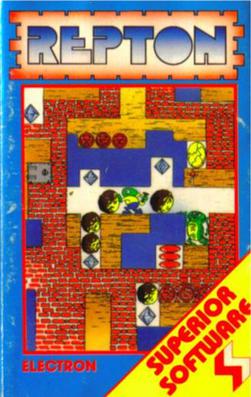
Repton is a video game originally developed by 16-year-old Briton Tim Tyler for the BBC Micro and Acorn Electron and released by Superior Software in 1985. The game spawned a series of follow up games which were released throughout the 1980s. The series sold around 125,000 copies between 1985 and 1990 with Repton 2 selling 35,000 itself. The games have since been remade for several modern systems, including iRepton for the iPhone / iPod Touch in 2010, and Android Repton 1, Android Repton 2 and Android Repton 3 from 2016 to 2018.

Superior Software Ltd is a video game publisher. It was one of the main publishers for the BBC Micro and Acorn Electron computers in the 1980s and early 1990s, and occasionally published software to the Commodore 64, Amiga, ZX Spectrum and Amstrad CPC. It currently releases games for Microsoft Windows, iOS and Android, mostly updates of its original games.
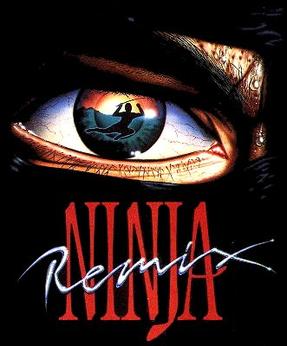
Last Ninja is a series of video games published by System 3. The first game in the series titled The Last Ninja, was released in 1987 for the Commodore 64 and was one of the most successful games for the system. In 1988, System 3 released Last Ninja 2, and in 1991 the third game in the series, Last Ninja 3. In 1990, Last Ninja Remix was released for 8-bit systems. This was Last Ninja 2 with new music, a new introductory sequence, slightly changed graphics and fixed bugs. Confusingly, the 16-bit versions of the original The Last Ninja game were also released in 1990 as Ninja Remix.
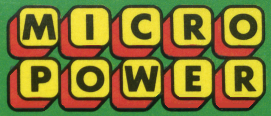
Micro Power was a British company established in the early 1980s by former accountant Bob Simpson. The company was best known as a video game publisher, originally under the name Program Power. It also sold many types of computer hardware and software through its Leeds 'showroom' or via mail order.

Artic Computing was a software development company based in Brandesburton, England from 1980 to 1986. The company's first games were for the Sinclair ZX81 home computer, but they expanded and were also responsible for various ZX Spectrum, Commodore 64, BBC Micro, Acorn Electron and Amstrad CPC computer games. The company was set up by Richard Turner and Chris Thornton. Charles Cecil, who later founded Revolution Software, joined the company shortly after it was founded, writing Adventures B through D. Developer Jon Ritman produced a number of ZX81 and Spectrum games for Artic before moving to Ocean Software.
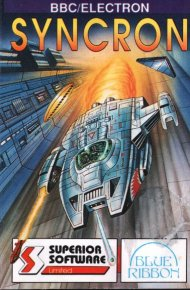
Syncron is a vertically scrolling shooter written by Gary Partis for the BBC Micro and Acorn Electron and published by Superior Software in 1987.

Castle of Riddles is a text adventure released by Acornsoft for the BBC Micro and Acorn Electron (1984) home computers. The game was written by Peter Killworth and was one of a series of text adventures written for, or ported to the BBC Micro by the same author. As with all such games, only text is used. The player must use a simple 'verb-noun' format to control the game. Unlike Killworth's other Acornsoft adventures, Castle of Riddles was not updated and reissued by Topologika so became unavailable after 1985 when Acorn Computers pulled out of the games publishing market. Some of the puzzles however were included in the Topologika version of Philosopher's Quest.
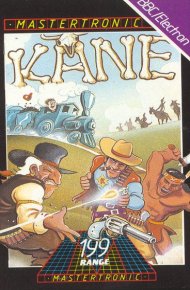
Kane is a multi-section action game published by Mastertronic for the Commodore 64 in 1986. It was ported to the Acorn Electron, Amstrad CPC, BBC Micro, ZX Spectrum, and the Commodore 16 and Plus/4. The game is set in the Wild West, and its name is a reference to the main character of the film High Noon. It consists of four distinct scenes, although some versions only contain two. A sequel was released in 1988.

Graphic Adventure Creator is a game creation system/programming language for adventure games published by Incentive Software, originally written on the Amstrad CPC by Sean Ellis, and then ported to other platforms by, amongst others, Brendan Kelly (Spectrum), Dave Kirby and "The Kid" (C64). The pictures in the demo adventure, Ransom, were made by Pete James and the box cover art by Pete Carter.
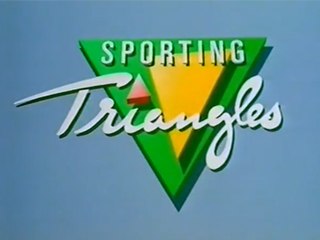
Sporting Triangles is a British game show that aired on ITV from 7 January 1987 to 13 August 1990. It was originally hosted by Nick Owen for the first two series and then hosted by Andy Craig for the last two series.

Hunchback is a video game developed by Century Electronics and published in arcades in 1983. The game is loosely based on the 1831 Victor Hugo novel The Hunchback of Notre-Dame and the player controls Quasimodo. Set on top of a castle wall, the player must guide the Hunchback from left to right while avoiding obstacles on a series of non-scrolling screens. The goal of each screen is to ring the church bell at the far right.
Alligata Software Ltd. was a computer games developer and publisher based in Sheffield in the UK in the 1980s.

Superman: The Game is a 1985 video game designed by Fernando Herrera and published in the US by First Star Software for the Commodore 64. For European release, Superman was ported the Acorn Electron, Amstrad CPC, Atari 8-bit computers, BBC Micro, and ZX Spectrum.

Superman: The Man of Steel is a 1989 video game featuring the DC Comics character Superman. It was developed and published by UK software company Tynesoft under license from First Star Software.
The English Software Company, later shortened to English Software, was a Manchester, UK-based video game developer and publisher that operated from 1982 until 1987. Starting with its first release, the horizontally scrolling shooter Airstrike, English Software focused on Atari 8-bit computers of home, then expanded to other platforms. The company used the slogan "The power of excitement".

Jet-Boot Jack is a platform game written by Jon Williams for Atari 8-bit computers and published by English Software in 1983. It was ported to the Acorn Electron, Amstrad CPC, BBC Micro, and Commodore 64. A C64-only sequel, Legend of the Knucker-Hole, was released in 1984.

By Fair Means or Foul is a boxing video game first published for a range of 8-bit home computers in 1988 by Superior Software. It was later reissued with the new title by Codemasters who also published conversions for 16-bit computers. The game offers a variety of boxing moves including fouls. The game received mixed reviews.
















